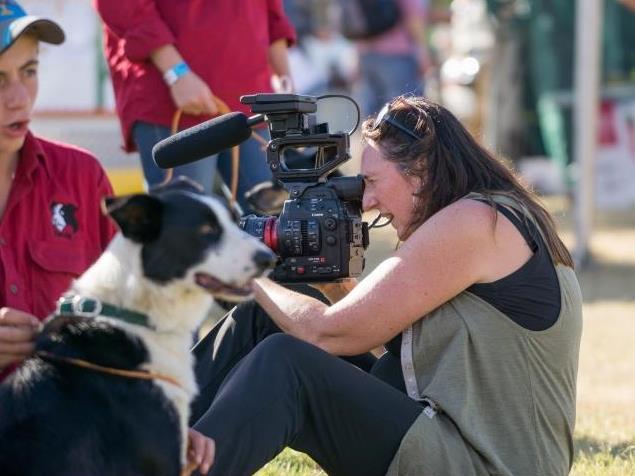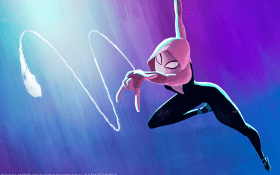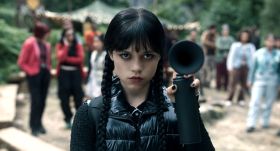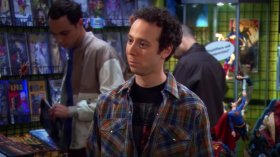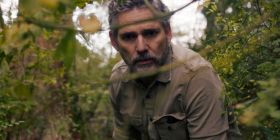Image: Catherine Scott, producer, director and cinematographer, shooting with boys and dogs. Supplied.
Documentary filmmaker Catherine Scott is a passionate defender of Australian stories so it’s fitting that the hero of her latest film, Backtrack Boys, seems at first like your classic laconic Aussie bloke.
‘I spent so much time with dogs that I think more like a dog than a person,’ Bernie Shakeshaft says in the film’s opening moments, in an accent as broad as the country is wide. He’s the kind of charismatic laid-back man beloved by 1980s tourism ads: lean and rangy, with sun-crinkled blue eyes beneath the brim of a cowboy hat. He can ride horses and whisper dogs into obedience, and he likes a choice swear word or three. He used to be a jackaroo and one of the best white trackers in the Northern Territory.
The macho cliches crumble, however, when we learn that Shakeshaft cries easily and loves without reserve. He’s a youth worker in regional NSW, helping troubled kids by involving them with showjumping dogs. The program he’s developed over the last 12 years has assisted 1000 kids and the juvenile crime rate in the area is down. Prince Harry and Meghan met with him last week in Dubbo, and had a go at jumping the dogs, though of course that’s not in the film.
Backtrack Boys is a film that’s almost embarrassingly heart-warming and irresistibly inspiring.
Seriously, we defy anyone to remain unmoved and dry-eyed at the sight of a barrel-load of puppies tumbling around in the grass with troubled, but now-hopeful, teens; or the vision of a manly man who manages to be gentle and articulate about feelings, while helping the next generation to do the same. And then there are the dogs. Bright-eyed clever working animals that need calming and training, and feel the absolute need to run off their energy. The match between the ‘mob of feral pups and the mob of feral kids’ (as Bernie puts it) is perfect.
This is a crowd-pleasing film that’s already won three audience awards: at the Sydney Film Festival; Melbourne Film Festival; and Canberra’s Stronger than Fiction Film Festival. Now Catherine Scott, the film’s writer-director-cinematographer, is hoping she can lure general audiences into cinemas this weekend, as the film, distributed by Umbrella on about 60 screens, tries to compete with the likes of A Star is Born and later, Halloween. ‘I feel like there are ocean liners going by and we’re on a little rowboat, trying to survive the wake,’ says Scott on the phone to Screenhub. After spending two years almost single-handedly producing, shooting and directing the film, she’s understandably evangelical about getting the word out in time. It seems others are equally enthusiastic. ‘Everyone gets evangelical when they see the film,’ Scott says. ‘I’ve had emails from people competing with me at the AACTA Awards saying, “I’m voting for you.”‘
Scott is a documentary filmmaker who’s been working in Australia and internationally for the past 20 years, including stints as a senior producer for Dateline SBS TV and a producer for the ABC’s Four Corners. Her previous feature documentary was the 2011 film Scarlet Road, following the story of Rachel Wotton, a freedom of speech campaigner and sex worker with a clientele of people with disability. Scott was also the director/co-producer of Walkley Award-winning TV doc Business Behind Bars (2000), about the privatisation of Victoria’s prisons, and Profits of Punishment (2001), looking at overcrowding and privatisation in US prisons.
A couple of years ago, she was at a party talking about those films of hers that had been so critical of prisons and the incarceration system. The conversation turned to her plans to get a diabetic alert dog for her seven-year-old son, who has Type 1 diabetes.
‘I wanted a Border Collie,’ she says. ‘The person I was talking to, goes “border collies and prisons! You’ve got to meet this guy called Bernie Shakeshaft in Armidale, NSW. He’s doing all this amazing stuff with kids who are falling through the cracks, and turning their lives around with his dog jumping team.” And immediately I thought I had to meet him. I could immediately see the visuals. Two weeks later, I was up there filming. Bernie had been doing this work for ten years already, and I couldn’t believe no one had made the film before.’
Backtrack Boys is an observational documentary that lets its young subjects do much of the talking. There’s 17-year-old Zak, bright-eyed, charming and chatty. An Indigenous kid from Gunnedah, he’s been working with Bernie for more than six years and discovered he loves to read. He even mentors the younger boys, and helps out with a dogs-in-schools reading program. (Who would have thought that having a dog to pat can actually help a hyper kid calm down enough to hold a book?) But Zak’s prone to drinking and fighting, especially when he’s around his family. Bernie struggles to keep him out of jail. Still, there’s no kicking someone out of the Backtrack program. That’s part of its secret, and part of the way the film subverts the common genres around tough love, teenagers and bootcamp.
‘I think a lot of people are expecting tough love because Bernie swears a lot and he’s a jackaroo,’ says Scott, ‘but that gets challenged early in the film. He’s completely out of the box. He never lectures the kids, and even when they keep going off the rails, he keeps bringing them back for the long haul.’
Another star of the film is ‘Russell’, a tiny fair-haired twelve-year-old with serious anger issues. His mum died when he was just weeks old, and he’s liable to kick in doors when he’s cross. Over the course of the two years filming, Scott’s camera intimately and sensitively records a remarkable journey as Bernie draws out the kid with gentle questions, and matches him up with a giant dog. Or should we say, the dog chooses the boy, because this is the way Bernie works.
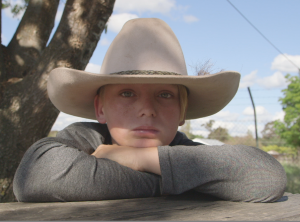
Image: Rusty, one of the Backtrack Boys. Supplied.
The way Scott worked was fast, quick and lean. Juggling family commitments and other jobs for money, including teaching at AFTRS and working on Foreign Correspondent, she’d drive from her home in Sydney and make short trips to film key scenes for the film, usually spending a couple of days at a time. She’d hold the camera herself, with radio mics and a shotgun mic on top of the camera. She says she’d prefer to have had a crew, but there wasn’t any money, especially to start off with. Canon came on board part way through the filming through their philanthropic ‘Show us what’s possible’ program, offering a Canon c300 camera and some MK 2 lenses.
It must be said, the film looks and sounds gorgeous. Post production money helped to jazz it up, but Scott had captured the essentials efficiently and well, a result she says of her many years working in fast turnaround TV. Editor Andrea Lang had 150-200 hours of footage to cut, which isn’t too bad when you think of the two years filming.
A mother of ‘two rather wild young boys’ herself, Scott says she’s learnt a lot about parenting from observing the Backtrack program. ‘There’s a lot of talk about toxic masculinity, and we never use those words in this film,’ says Scott, but what Bernie is trying to do is teaching these boys how to grow into men and be non violent and caring and respectful, and a lot of these kids haven’t had that. For them to learn that, and to then mentor each other, is quite profound.’
As for what she learnt herself, ‘The big thing is that you don’t chase, you draw. If you chase, you’ll never catch the kids. You’ve got to try to engage them in what you want them to do. Then there’s the listening. I’ve noticed that when Bernie is listening to the kids he’ll make himself smaller, he’ll go lower than them, all very physical things, including the way he uses his voice. You put the pressure on, but you have to take it off. We tried to do that with the filmmaking too. You have a moment where the kids are having to confront something quite intense, and there’s a little release moment – a cuddle or a joke.’
If this sounds like the principles of good drama, that’s intentional. ‘I’m gravitating more to long-form documentary and feature documentary because I love being able to create layers in the storytelling and develop it like a three-act drama,’ Scott says. ‘I seem to be a fish swimming upstream because at the moment everyone else wants episodic factual formats and blue chip essay films, and I feel like I was doing that way back when everyone else was doing observational. I feel like I’m always on the wrong side of the street.’
Financed in part by the Documentary Australia Fund (DAF) which matches up philanthropic donors with films that mirror their causes and interests, Backtrack Boys is executive produced by DAF’s Mitzi Goldman and Katie Barry, who raised $187,000 which then triggered funding from Screen Australia and Create NSW. Umbrella were on board early as theatrical distributors, which was essential in getting the money from the agencies.
The lack of one-off documentaries being commissioned and broadcast by the national broadcasters is one of Scott’s big beefs, but we’ll talk about that in another article. For now, the emphasis is on getting audiences to see the film on the big screen.
Scott explains the strategy, which sounds comprehensive and exhausting. ‘We’re working with Umbrella and we’ve also teamed up with Unlimited, an organisation that have come on board as a partner and they work with various media organisations. They’ve got us spots in newspapers, trailers at petrol stations and gyms and billboards in shopping centres. All the spaces they don’t sell, they give to people who are doing this kind of community work. There are lots of social media campaigns, as well as hosted screenings coordinated with community groups who have an interest in youth issues. We have a person who is calling up every single youth organisation and those involved in assistance dogs and rescue dogs, the RSPCA. It’s kind of like a grassroots campaigning. We are competing with multimillion dollar marketing budgets.’
After the film has finished in cinemas, during summer 2019, there’ll be a pop-up drive-in tour of country towns and a Video on Demand release through Umbrella.
Scott has a lot to say about the toll filming took on herself and her family, the unsustainability of feature documentary filmmaking in the current funding environment, and the need for the screen community to push back against a tide that would see small Australian stories eradicated. We will cover those thoughts in in a separate article.
For now, we wish Backtrack Boys well in the cinema, up against A Star is Born. Scott admits guiltily that she’d like to see that film too.
And in case you’re wondering, she did eventually get that diabetic alert dog. She’s called Foxy and she’s still in training. ‘She’s a learner with a little green vest with an L on it. I’ve dropped the ball a bit because filming has been crazy busy and my dog trainer is a bit cranky with me, but we will get there.’
